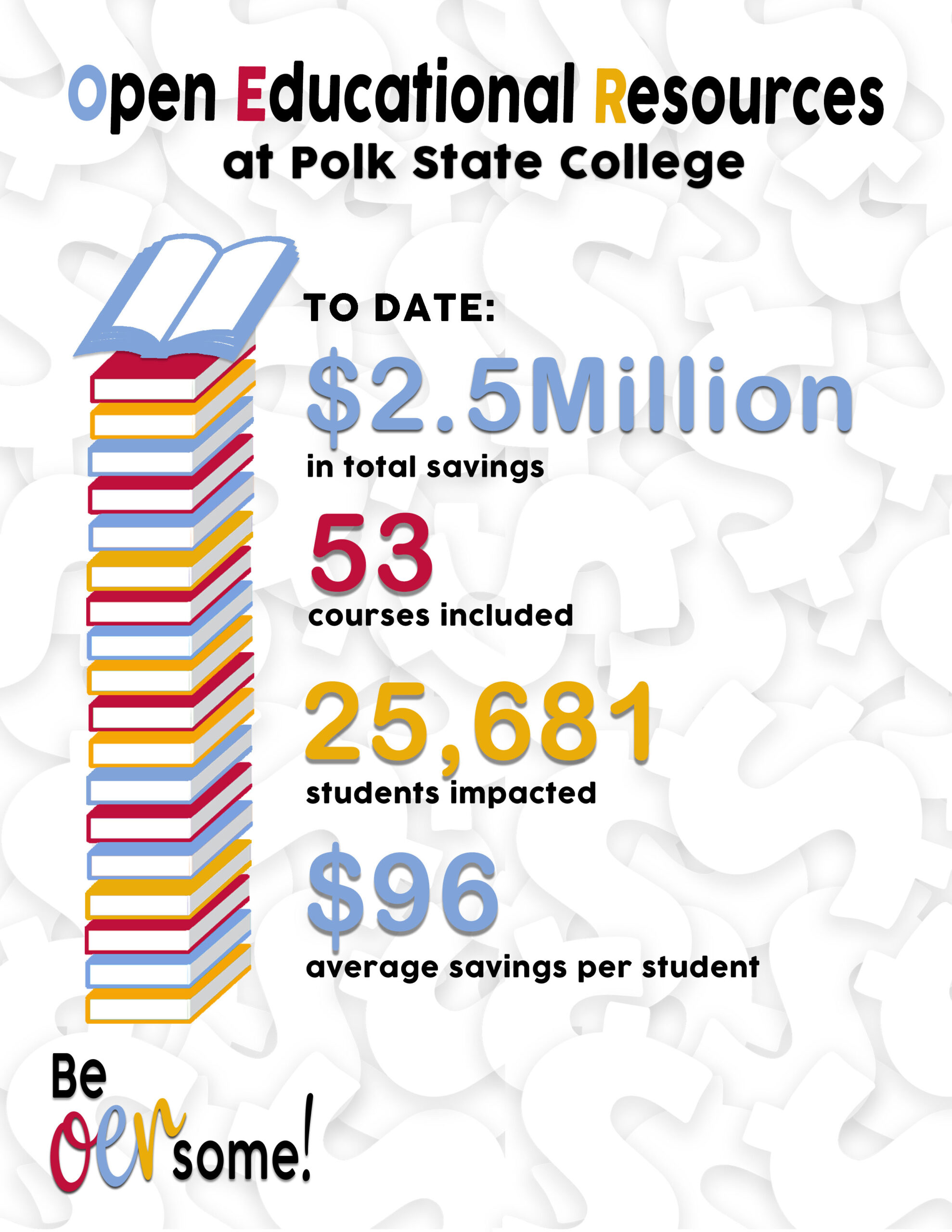Polk State’s Open Educational Resources save students $2.5 million

More than 25,000 Polk State students have saved $2.5 million in textbook costs thanks to faculty and staff who have worked to implement Open Educational Resources in College courses.
Open Educational Resources (OER) are teaching, learning, and research materials available in the public domain or released under open licenses that permit free access, use, and adaptation, as well as redistribution by others with no or limited restrictions. The initiative was launched at Polk State in 2017 with the assistance of a Complete Florida Grant and Staff and Program Development Funds.
“We are double where we wanted to be by this time,” said Katie Ragsdale, Instructional Designer with Polk State’s Learning Technology Department. “Our goal is to offer a fully OER Associate in Arts degree program and we are only five courses short from achieving that goal.”
This is due in large part to the buy-in and commitment of faculty who have adopted or created OER materials. By doing so, they are required to share their courses in Canvas Commons, which allows other instructors to adopt their materials. The Polk State Library has also been involved in sharing relevant resources.
This week is Open Education Week and the College is celebrating with activities students can participate in by dropping into the campus libraries, and with scheduled events for faculty who are interested in learning more about OER:
- March 6 | 3 p.m. – 4 p.m. | OER 101: Getting Started with Open Educational Resources
Sponsored by OpenOregon
Registration is required and available for free by clicking here - March 7 | 2 p.m. – 2:50 p.m. | Building Interactive Textbooks for OER-driven Courses
Sponsored by the Florida Instructional Designer Network
Registration is required and available for free by clicking here - March 9 | 3 p.m. – 4 p.m. | The Advantages of Using OER Among the Disadvantaged
Sponsored by the Community College Consortium for OER
Registration is required and available for free by clicking here
Twenty-three faculty members have implemented OER into 53 courses thus far. Students can check whether a course uses OER materials when registering for classes in Passport by checking the “notes” section on the course they are interested in.

Professor of English Fatin Morris Guirguis shared that throughout her 20-year career at Polk State, she has seen many students struggle with the cost of education. While tuition at Polk State is approximately one-third of the cost of tuition at universities, the College continues to seek ways to lessen the financial burden on students.
“Students are of course thrilled by the fact that they don’t have to buy a textbook or go to the library or the bookstore to be successful.”
Professor of Sociology and Film Studies Joseph Cook, who also serves as the Social Sciences Department Coordinator on the Lakeland Campus, echoed this sentiment.
“After 18 years of teaching, it stunned me to see what an increasing burden textbook costs were on our students,” he said. “Textbooks were a burden when I was a college student, but the books and their supplemental resources have become shockingly expensive.”
“Many [students have] postponed buying textbooks for weeks or used older editions at the expense of their academic performance,” Morris Guirguis explained. “I was actually thrilled to change all my courses to OER. It has saved students money and time. All materials are accessible at their fingertips. They don’t have to budget for books or even go out to buy them. As a result, many students who don’t have enough funds nor easy access to transportation were able to successfully complete the course.”
Faculty have received positive feedback from their students on both the quality of OER and the cost savings.
“Multiple times over the last five years, students have told me that they find the organization of the variety of materials in my courses to be easy to follow and engaging,” Cook shared. “I’ve also been thanked many times by students for their ability to save money.”
Morris Guirguis added that faculty understand the struggles of being a student because they were once students themselves.
“I am sure each of us faculty members has a story to tell about our college years and the limited means that we had,” she said. “We know what it means to have free and accessible college textbooks and materials.”
“I would definitely encourage every faculty member to move to OER,” she added. “The effort is worth it.”

